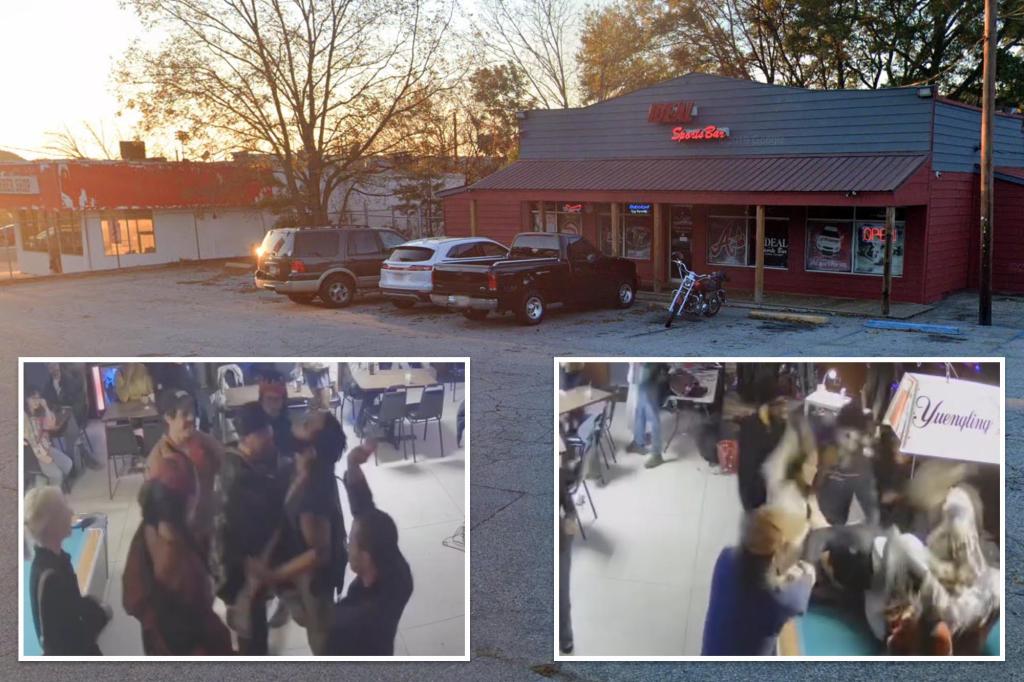The eruption of violence at Ideal Sports Bar in Atlanta serves as a stark reminder of the volatile mix of racial tensions, political rhetoric, and alcohol. What began as a seemingly typical night of live music quickly devolved into a chaotic brawl, leaving several injured and raising serious questions about the responsibility of establishments in preventing such incidents. The incident underscores the precarious nature of social harmony in a society still grappling with its complex racial history and the potential for seemingly innocuous events to escalate into violence.
The altercation reportedly stemmed from politically charged, derogatory comments made by the performing band towards white patrons. The band’s inflammatory language, as reported by witnesses, ignited a tinderbox of racial animosity, transforming the atmosphere from festive to hostile. This initial provocation, although reprehensible, does not excuse the subsequent escalation of violence by patrons, some of whom reportedly retaliated with racial slurs of their own. While the band’s actions may have been the catalyst, the rapid descent into physical violence highlights the underlying tensions present within the bar that night.
The situation deteriorated further with the introduction of a racial slur directed at the black band members. This inflammatory language acted as a match to the already smoldering resentment, igniting a full-blown physical altercation. The band abandoned the stage, and the bar erupted into chaos. Patrons turned on each other, engaging in a melee that involved punches, pool cues used as weapons, and a general disregard for the safety of others. The scene, as captured on surveillance footage, paints a picture of uncontrolled aggression and underscores the dangers of unchecked anger fueled by racial prejudice.
The surveillance footage provides a chilling visual account of the escalating violence. It shows a young black guitarist from the band seemingly taunting an older white man near the pool table before the brawl erupts. While the exact trigger for the physical altercation remains unclear, the video captures the rapid spread of violence throughout the bar. Patrons are seen throwing punches, wielding pool cues as weapons, and engaging in a chaotic free-for-all. One particularly disturbing scene shows a man pinning a woman on a pool table while repeatedly striking her. The footage underscores the volatile and unpredictable nature of mob violence, where individual actions quickly become lost in a maelstrom of aggression.
The aftermath of the brawl left the bar in disarray, marked by bloodstains on the floor and a palpable sense of shock among those present. One woman sustained a significant head injury, requiring eight stitches, highlighting the physical toll of the violence. Beyond the immediate physical injuries, the incident left a deeper wound on the community, exposing the raw nerves of racial tension and the ease with which they can be inflamed. The incident serves as a sobering reminder of the importance of promoting dialogue and understanding to bridge racial divides and prevent future eruptions of violence.
In the wake of the incident, Ideal Sports Bar issued a statement on social media acknowledging the gravity of the situation and apologizing for the violence and bigotry displayed by both the band and patrons. The bar’s management admitted to a lapse in judgment in their selection of the band and pledged to implement stricter screening procedures in the future, including reviewing lyrics for hateful content. While the apology and promised changes are welcome steps, they do little to undo the harm caused that night. The incident leaves a lingering question: could more have been done to prevent the escalation of violence, and what responsibility do establishments bear in ensuring the safety and well-being of their patrons, particularly in the face of escalating tensions? The incident serves as a case study in the complexities of managing public spaces in a society grappling with historical and ongoing racial divides.


